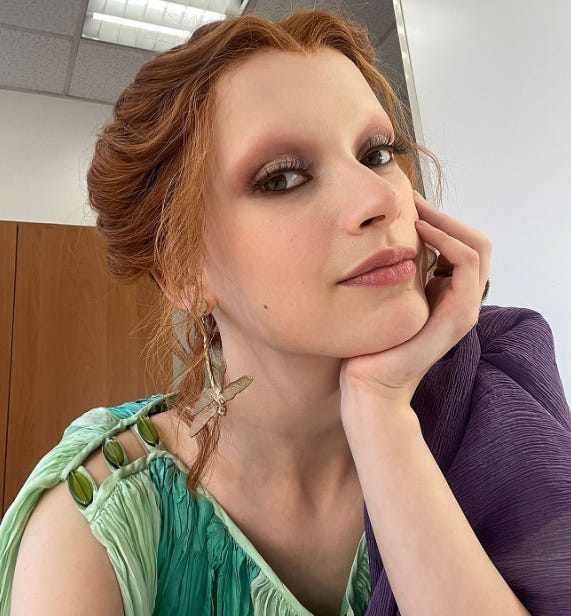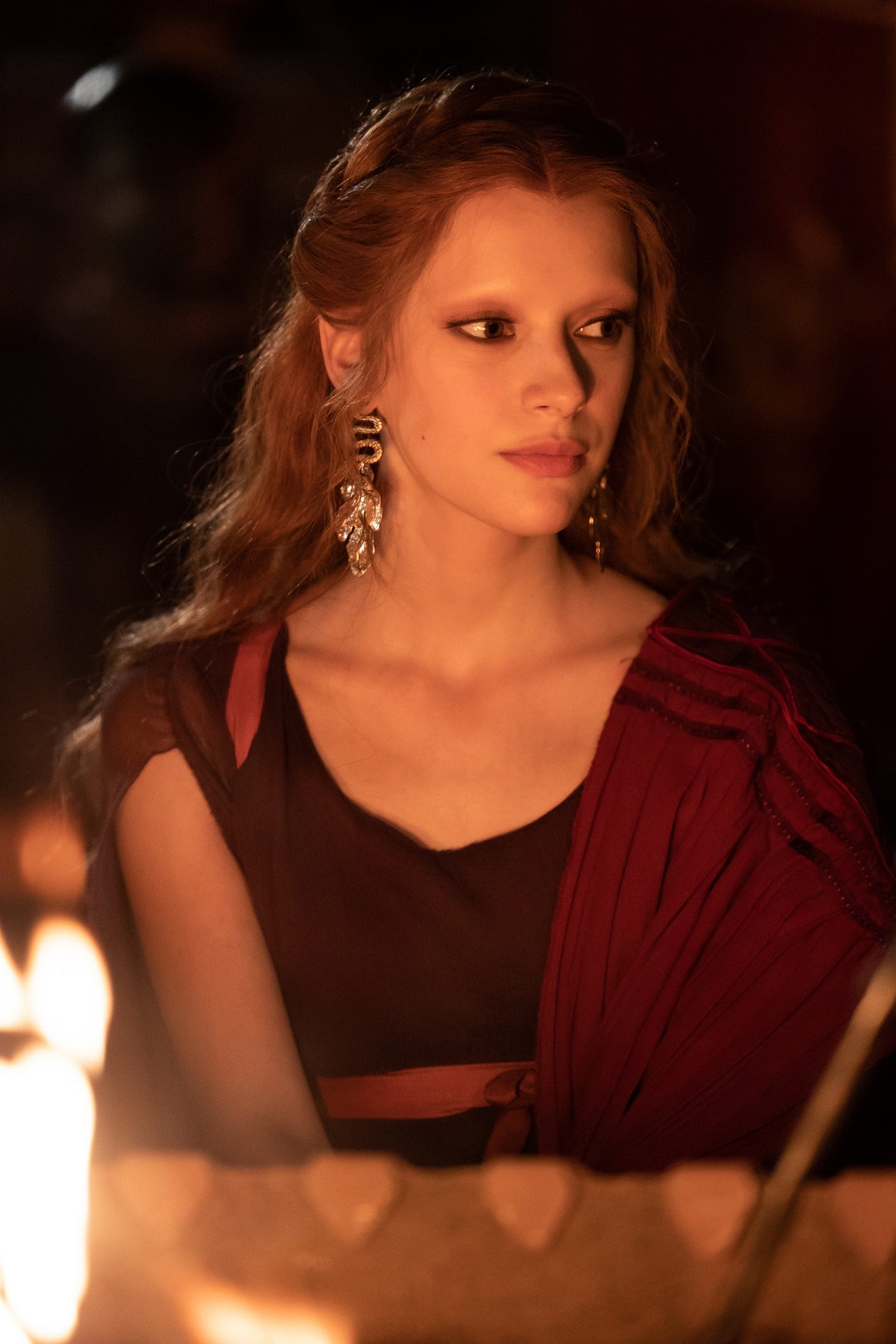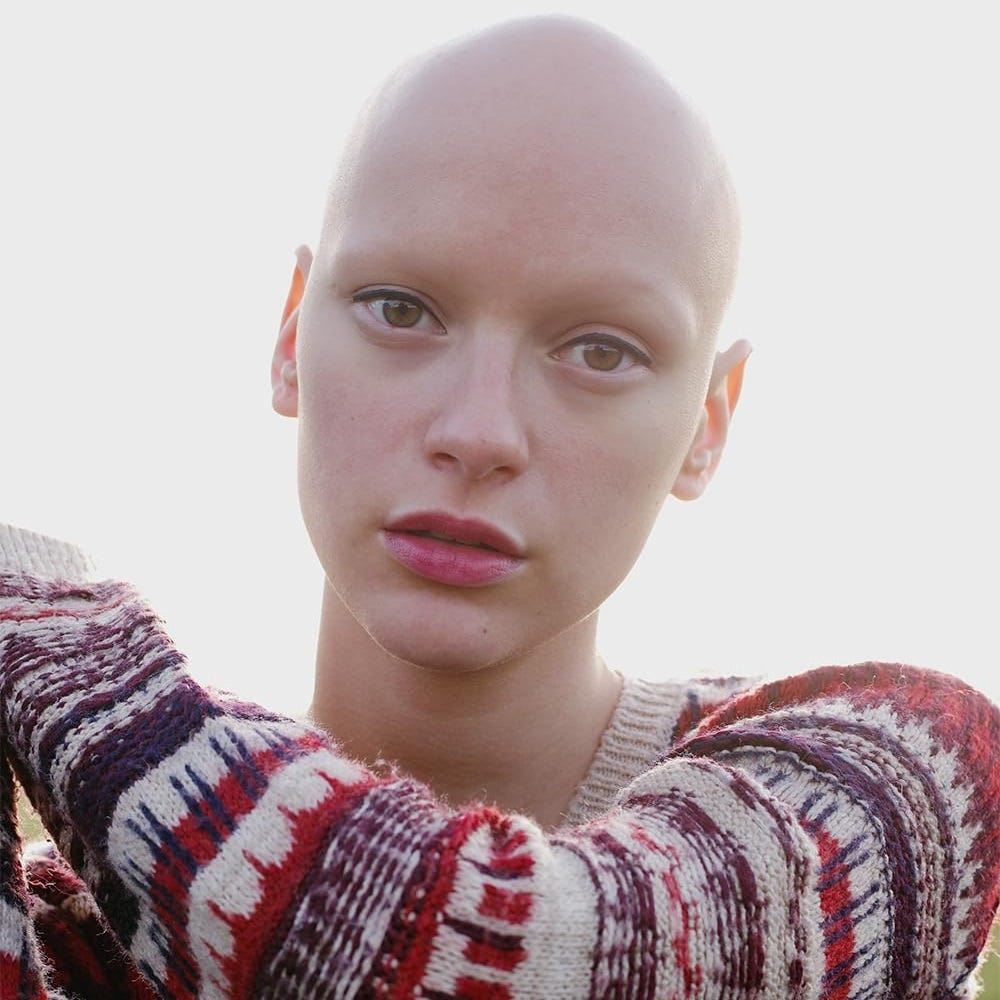From Alopecia Advocate to Ancient Rome: A Conversation with Joelle On Her Journey Into Acting and DOMINA
Joelle opens up about her path into acting, the challenges of alopecia, and the importance of finding strength in setbacks
1. Can you tell us about your journey into acting and how you landed the role of Vipsania in DOMINA?
I grew up in a creative family, a typical Sunday morning would be singing and songwriting around the breakfast table. I always felt inspired to create and particularly loved songwriting and performing. As a child, I began acting at weekend performing arts classes, but unfortunately, I didn’t have a good time as I was bullied for always wearing a hat to cover my alopecia, which was before I had a wig. So I left the school and stopped performing. Several years later after the dust had settled, I started having private singing lessons and stage training, which was a revelation for me. It was like revisiting a bad memory and turning it into something positive as I realised that performing was one of my greatest joys. I started making little films and music videos with my family with a pocket camera, with what felt like only a bucket and a stick to hand, which was a great learning experience! My love for performing grew the more I created. I went from studying film and TV in higher education, to small roles and it grew from there. Next thing I knew, I was living in Rome filming Domina!
2. How does it feel to be part of a historical drama series like DOMINA that tells the story of Ancient Rome through a female perspective?
It feels very special and it also makes me appreciate not being alive during Ancient Rome! It was a brutal time and it’s interesting to see how much it took to stay afloat as a woman, in a society which pretty much dictated your role with such limitations, starting with the fact that women couldn’t vote. It’s an important perspective for audiences to see what life was like for women in different positions of society and the struggles they faced in Ancient Rome. You realise how harsh life was back then, even if you were born into an aristocratic family, you had a duty to fulfil and the last thing you wanted was to bring shame upon your family.
3. You have a significant moment in the series where you remove your wig. What was it like filming that scene, and what message do you hope it conveys?
We had a lot of discussions about how we wanted to go about the scene prior to filming. Ben and I spoke a lot about Tiberius and Vipsania’s relationship and their dynamics, and we were both on the same page about it right from the get-go. That scene in particular gives a closer look into their private relationship. It was important to me that we visually showed how Tiberius and Vipsania’s relationship is very different from the typical Roman married couple that we see in the show. First of all they share a bedroom, which was not typical between a husband and wife in Ancient Rome, they love each other truly, regardless of all of their quirks and will do anything to make each other happy, not because they feel it is their duty, but because they love each other.
Among other things, hair was something that the Romans had very strong opinions about when it came to beauty standards. If you had no hair as an old man you were seen as wise, if you had no body hair as a young woman you were seen as someone who was upper class and valued hygiene, but if you had no hair on your head as a young woman you were seen as undesirable. Even though it’s not directly spoken about in the show, it was a moment that emphasised that they have no secrets between them and they love each other regardless of what they look like and of other people’s opinions. It also signifies their strength as a couple, who are prepared to do everything in their power not to let the politics of Ancient Rome affect their happiness.
4. How has alopecia shaped your perspective on body image, and what advice would you give to young people who may be facing challenges related to body image or self-esteem?
I wasn’t ready to be visually different and at first it was a shock to me and my family. At the time, social media was not what it is today and there was hardly any information online about living a happy life with alopecia. Most of the content I came across spoke about alopecia in a negative light, which made it difficult for me to visualise a happy future for myself. It took me a while to realise I had been given the opportunity to decide who I wanted to be, rather than let society’s beauty standards influence who I should be.
I wasn’t comfortable with my body image growing up until my early teens, I don’t remember having an opinion about how I looked until I had alopecia. After this, I spent several years not really looking at myself in the mirror, thinking that I couldn’t possibly be happy because society was telling me that I was a tragedy. Children at school were calling me names and children in my class were talking about wanting to get plastic surgery. As I started to accept who I was as a person and my appearance, alopecia actually taught me to love myself. I realised that no one else should decide how you should feel about yourself and what you believe is beautiful. Beauty standards are constantly changing and are vastly different, depending on where you are in the world.
In today’s digital society we’re so image-conscious that it makes it easy to focus on the negatives and things we dislike about ourselves. If you’re facing a challenge related to body image or self-esteem, I would encourage you to focus on something you love about yourself every day. It doesn’t have to be big, it can be really small, but if you are consistent, you will realise that there is so much more to you and to embrace what makes you unique.
5. In what ways has having alopecia influenced your career as an actress and singer-songwriter?
When I found out I had alopecia, acting and singing was something that was very private for me, something that was only a fantasy because of the stigma attached to having no hair at the time. I believed that acting in the outside world wouldn’t happen for me, because I didn’t have a positive role model to look up to and had never seen a female with alopecia universalis on the big screen. I began to understand that if I wanted to pursue my dream, then I needed to create awareness about alopecia and pave the way.
“Alopecia shouldn’t stop you from achieving anything, no matter how enormous the challenge”
I felt it was my responsibility to succeed in order to make life easier for my younger self and others, to demonstrate that alopecia shouldn’t stop you from achieving anything, no matter how enormous the challenge. In the early days when I started alopecia awareness campaigning, media outlets would gravitate towards using the word “suffering” when referring to alopecia, which was difficult because I was not in that place anymore. All over the world people developed communities online, discussing and sharing their experiences and positivity spread like wildfire. The UK charity Alopecia UK saw the work I was doing and eventually I became an ambassador for the charity, which has been a brilliant experience with the positive work they do. It’s a very different world now where you will find media coverage celebrating alopecia.
6. One of The Female Lead’s themes is to “Find strength in setbacks”. How do you find strength in setbacks, both in your personal life and career?
Setbacks happen all the time, it’s part of life.
“It’s all about perspective, you can either see a setback as something that defeats you, or you can see it as an experience to develop as a person and learn something new.”
I try to see every setback I encounter as a way to develop new tools for problem solving.
7. What advice would you offer to aspiring actors and artists who face challenges or setbacks along their paths?
Try to view challenges and setbacks as opportunities to learn and grow. We all experience setbacks, but it’s how you perceive them and how you overcome them that makes all the difference. If something isn’t working, take a moment to review it from several perspectives, and try a different approach. We all make mistakes and at the end of the day we are all human, so making a mistake is inevitable. The one thing we can control is how we deal with the challenges we face and what we can accomplish from them. Your hard work will pay off the more you learn and the less you fear. Many things will get easier and won’t seem so daunting the next time, that’s when you’re ready to take on new challenges and overcome any new setbacks that may arise.
8. What are some of the valuable lessons you’ve learned throughout your career in the entertainment industry?
Teamwork is crucial; I’m often on film sets with people from different backgrounds and something I learned very quickly was how important it is to be able to adapt instantly to different environments. Everyone has a unique way of working, which may be unfamiliar to what you’re used to, and it’s essential to stay open-minded. One approach you may have used in the past, might not work in another situation and it can be tricky to find someone’s flow, but once it clicks it’s like magic and everything falls into place. Being open-minded when being creative is key.
About the contributor:
Joelle was born in Chelsea, England. She is British-Austrian, having lived the majority of her life in London.
Joelle grew up in an artistic household writing poems, songs and creating videos as a child. Having no hair since the age of 8 due to alopecia universalis, Joelle endured bullying at school and in public, which motivated her to want to change the way people view alopecia. By the time she was 13, Joelle became an internationally recognised alopecia awareness campaigner, after receiving an outpouring of praise from the public for her music performances and video creations.
During her early teens, Joelle won several film festival awards, a pivotal time which led to her honing her skills, vocal training in Atlanta, Georgia with Peggy Still Johnson and further stage training with former director of the London Community Gospel Choir, Daniel Thomas. Following her success as an alopecia awareness campaigner, at 15 she became an ambassador for the UK charity Alopecia UK.
Joelle went on to study TV and film in higher education and later directed and performed in her first short film Cover Up (2019), featuring original sound recordings composed by multi-Grammy winning Oscar-nominated songwriter Diane Warren. Joelle made her feature film debut in Denis Villeneuve’s Dune (2021), plays the character ‘Joelle’ in Paul Feig’s Netflix film The School for Good and Evil (2022), ‘Joiya Byir’ in Amazon Studio’s second season of The Wheel of Time (2023), and the role of ‘Vipsania’ as a series regular in season two of MGM+ and Sky’s historical TV drama Domina (2023).
Joelle’s performance style has been described as unforgettably genuine and unique.
Joelle is represented by United Agents.
Socials: IMDb, Instagram, TikTok.
Domina season two is available on Sky Atlantic and NOW





